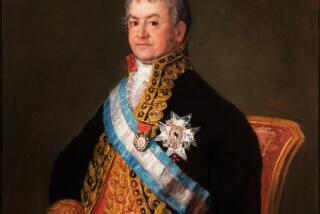Paul Conrad Donates Archive to Huntington
- Share via
Paul Conrad, the three-time Pulitzer Prize-winning political cartoonist whose work has outraged and delighted readers of The Times for the past 30 years, has donated his archive to the Huntington Library in San Marino.
The gift consists of several thousand drawings and sketches for cartoons, created over the course of Conrad’s career at the newspaper, from 1964 to the present. Subjects of the cartoons include U.S. Presidents, Los Angeles mayors, other political figures and social issues such as abortion and race relations. The artist also gave the Huntington his correspondence files including letters from public figures featured in his cartoons and from the public. “This is a major contemporary collection that will be available to researchers in the years ahead,” Huntington Library Director William Moffett said in announcing the donation. “Conrad has done a very good job of keeping all his materials together, so we have a fairly comprehensive collection. It shows all the stages of preparing cartoons for the newspaper. He even saved his hate mail.”
The Conrad archive will join what is probably the nation’s largest historical collection of political cartoons, Moffett said, noting that the collection’s strength has been 18th- and early 19th-Century British material. “We haven’t been systematically collecting from the 20th Century, but Conrad’s gift is a signal that we are willing to collect 20th-Century cartoons and caricatures,” he said.
The artist said he decided to give his collection to the Huntington for two reasons: “They asked, and I don’t know of any place that is better equipped to take care of it.
*
“They will de-acidify the roughs and the cartoons,” Conrad said. “They gave me a tour of the place, and it was astounding. Once I saw what they can do to preserve things, I said, ‘Why not?’ I could break up the collection and give it to my kids, but they wouldn’t know what to do with it.”
In building a major collection of political cartoons, the Huntington has taken its cue from Herbert Hoover, who served as a trustee of the library in the 1930s, Moffett said. “He was the butt of cartoons during his presidency and he continues to pop up as a symbol of the Depression. But on one occasion, when he spoke here, Hoover said he was delighted to find political cartoons in the collection because they help us understand political ideas and offer a window to public opinion.”
Conrad, 69, was born, raised and educated in Iowa. He got his professional start at the Denver Post, where he was a cartoonist from 1950-64, and were he landed his first Pulitzer Prize in 1964. After then-publisher Otis Chandler recruited him for the Los Angeles Times, Conrad won Pulitzers in 1971 and 1984. He is also a three-time winner of the Robert F. Kennedy Journalism Award, and has garnered several other prizes for his work.
Although he left his early work at the Denver newspaper, the Huntington will attempt to add that chapter of Conrad’s production to the library’s collection if the material can be located, Moffett said. The collection also is expected to grow as Conrad continues to produce drawings.
Conrad retired last year, having decided to “throttle back somewhat,” as he put it, but his cartoons continue to be distributed by the the Los Angeles Times Syndicate and they appear twice a week in The Times.
The Huntington plans to put part of the Conrad collection on exhibition in 1995, Moffett said.
More to Read
The biggest entertainment stories
Get our big stories about Hollywood, film, television, music, arts, culture and more right in your inbox as soon as they publish.
You may occasionally receive promotional content from the Los Angeles Times.










